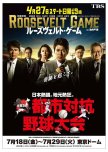Isn't “Roosevelt Game” an unusual title? Though at first glance it might look odd, once one learns the context things grow clearer. Franklin Delano Roosevelt, that famous American president, adored baseball—so much its terms often featured in his legendary radio addresses! But though he cherished the game as a whole, his favorite situation could be described as a close call; a terrific match was one, in his words, “that guarantees the fans a combined score of not less than fifteen runs, divided about eight to seven.” So a terrific drama like this one, with its engrossing tale of determination, close calls, and unexpected reversal… well, it could bear no better name.
There are actually two story lines in Roosevelt Game: one concerning the ailing manufacturer Aoishima Seisakujo, the other its beloved but struggling promotional baseball team. Both are written solidly enough to stand alone, but complement each other so well why should one want them to? Together, these plots form an exciting masterpiece—though I avoid using that word if it can be helped. Often the events in one half relate to those in the other—but without the heavy-handedness this narrative device often carries. Some parallels are so subtle as to create a feeling of “Ah!” in the viewer when they are realized. And, as one might expect from the team behind Hanzawa Naoki, an overall atmosphere of intensity and forward motion permeates both elements—business and baseball alike. It has all the intrigue and heart-thumping one could wish; several times I found myself exclaiming aloud or nearly jumping upright, no exaggeration.
Because they share an author in Jun Ikeido and even directors, it is impossible to talk about this drama without referencing Hanzawa Naoki. But please, do yourself justice before coming in: don’t expect another Hanzawa Naoki, even though certain components may resemble that excellent series. Roosevelt Game, I felt, was actually an improvement on the model in many essential respects. For one, the human element was decidedly more powerful here—there were even brilliant touches of the life drama Japan so excels in. Thematic components found themselves better applied across the board, creating one solid arc rather than two. But perhaps most telling, Roosevelt Game concludes its 9-episode run satisfyingly self-contained and complete…with one less episode, and no need for continuance. As wonderful as Hanzawa Naoki was and still is (I’ve both marked highly), there’s no reason to allow it to overshadow this rare discovery in its impressive enormity.
I mentioned cinematography earlier; let me conjure it up again briefly. There are indisputable similarities to Hanzawa Naoki (again, same team); you've got the intense close-ups, dynamic angles, and unique shots. However, Roosevelt Game again sets itself apart with brighter lightning and softer colors. I also don’t believe another drama exists with such brilliant baseball footage! Though it isn't my favorite sport, I would be a liar if I said these games were not as exciting or remarkable as any action sequence in Asian television. If they used body doubles for the players, I definitely couldn't tell.
Speaking of players, what a uniformly talented cast! Enough are worth mentioning that I could write another few paragraphs on performances alone—but I won’t do that to you. Karasawa Toshiaki portrays President Hosokawa, an unpopular choice for this important seat; I am unfamiliar with him in a leading role, but he caught my eye right away. There is something of the tiger about him, his method is quiet and understated—but when he strikes, you know. Next is Kudo Asuka, another relatively new face to me and in actuality, as ace pitcher Okihara. A simple and sweet character, Kudo draws the viewer in with a mixture of gentle heroism and unassuming relatability. Be warned you may leave this drama affectionately referring to him as Oki. His wonderfully eccentric coach Daido is a scene-stealing gift via Tezuka Toru, while an executive officer occupies a similar space in the form of Sasai (a delightfully complex and stormy Eguchi Yosuke). So many more I’d love to mention, but please meet them in the drama instead!
For the lack of a more elegant term, the soundtrack is killer. The compositions, exquisitely arranged by Hattori Takayuki (Hanzawa Naoki, Shinsengumi!, Nodame Cantabile) are to absolutely to die for. I am not joking when I say that I've scrambled to find the Roosevelt Game soundtrack for purchase. Though almost entirely instrumental (with a few dramatic exceptions), the songs cannot be stopped from creeping into the brain. They are of an almost universally cinematic quality, from the stirring introduction and intrigue themes to anthems of crushing defeat and spirited victory. If you love string instruments, you’ll be in heaven especially.
One final warning: Roosevelt Game is frighteningly addictive. I finished the entire thing in one sitting—on a work night no less, and I almost want to watch it again right away. Take care when you start!
Esta resenha foi útil para você?























